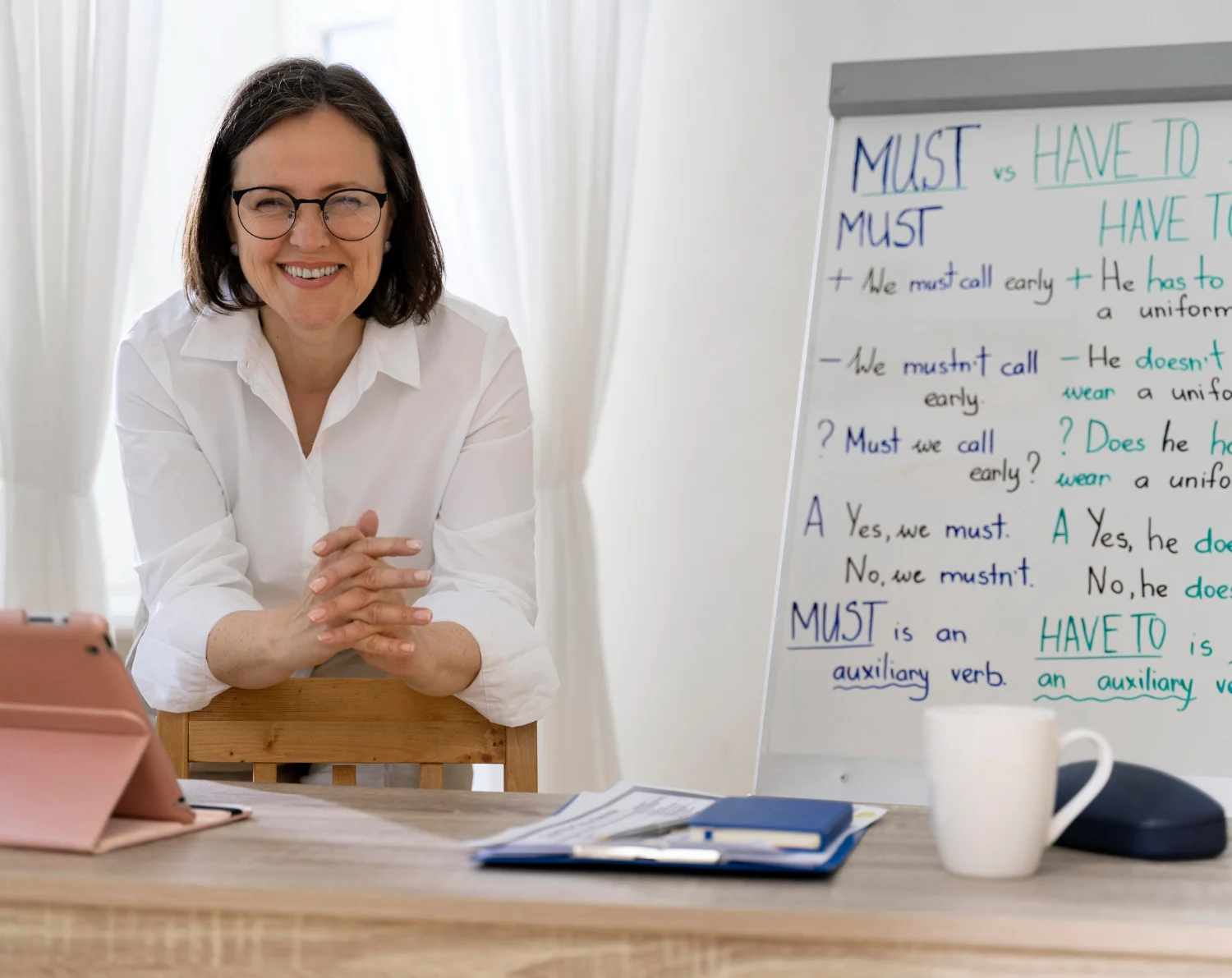“Bahasa Inggris punya 16 tenses? Banyak banget, sih!”
Kalau kamu pernah mengeluhkan hal serupa, kamu datang ke tempat yang tepat. Dalam artikel ini, kamu bisa mencari tahu lebih dalam soal tata bahasa yang sering digunakan dalam Bahasa Inggris, misalnya 16 tenses bahasa Inggris yang mungkin dianggap sulit oleh banyak orang. Mempelajari bahasa baru memang butuh ketekunan dan kerja keras, tapi nothing is impossible kalau kamu punya tekad yang kuat. Yuk, simak uraian di bawah!
Memangnya, Tenses tuh Untuk Apa, sih?
Meskipun terlihat rumit, penggunaan tenses Bahasa Inggris itu sangat penting untuk menjelaskan keterangan waktu dan urutan peristiwa pada suatu kejadian agar kamu bisa berkomunikasi dengan jelas dan mudah dimengerti.
Lalu, Apa Saja Jenis 16 Tenses Bahasa Inggris?

Simple Present
- Digunakan untuk menyatakan kebiasaan, fakta umum, atau keadaan yang selalu benar.
- Rumus:
- (+) S + V1 (he, she, it + V1+s/es)
- (-) S + do/does + not + V1
- (?) Do/Does + S + V1?
- Contoh:
- (+) She works every day.
- (-) He does not play football.
- (?) Do you like coffee?
Present Continuous
- Digunakan untuk menyatakan tindakan yang sedang berlangsung saat ini atau rencana di masa depan.
- Rumus:
- (+) S + am/is/are + V-ing
- (-) S + am/is/are + not + V-ing
- (?) Am/Is/Are + S + V-ing?
- Contoh:
- (+) I am reading a book.
- (-) They are not working today.
- (?) Are you studying right now?
Present Perfect
- Digunakan untuk menyatakan tindakan yang telah selesai di masa lalu dan memiliki hubungan dengan sekarang.
- Rumus:
- (+) S + has/have + V3
- (-) S + has/have + not + V3
- (?) Has/Have + S + V3?
- Contoh:
- (+) She has visited the museum.
- (-) I have not seen that movie.
- (?) Have they finished their homework?
Present Perfect Continuous
- Digunakan untuk menunjukkan tindakan yang dimulai di masa lalu dan masih berlanjut sampai sekarang.
- Rumus:
- (+) S + has/have + been + V-ing
- (-) S + has/have + not + been + V-ing
- (?) Has/Have + S + been + V-ing?
- Contoh:
- (+) They have been working for hours.
- (-) She has not been feeling well.
- (?) Have you been waiting long?
Simple Past
- Digunakan untuk menyatakan tindakan yang sudah selesai di masa lalu.
- Rumus:
- (+) S + V2
- (-) S + did + not + V1
- (?) Did + S + V1?
- Contoh:
- (+) I visited New York last summer.
- (-) He did not go to the party.
- (?) Did you watch the movie?
Past Continuous
- Digunakan untuk menyatakan tindakan yang sedang berlangsung di masa lalu pada waktu tertentu.
- Rumus:
- (+) S + was/were + V-ing
- (-) S + was/were + not + V-ing
- (?) Was/Were + S + V-ing?
- Contoh:
- (+) She was reading when I called her.
- (-) I was not studying last night.
- (?) Were you sleeping when I called?
Past Perfect
- Digunakan untuk menyatakan tindakan yang sudah selesai sebelum tindakan lain di masa lalu.
- Rumus:
- (+) S + had + V3
- (-) S + had + not + V3
- (?) Had + S + V3?
- Contoh:
- (+) They had left before I arrived.
- (-) I had not finished my homework when he called.
- (?) Had you eaten before the meeting?
Past Perfect Continuous
- Digunakan untuk menunjukkan tindakan yang telah berlangsung sebelum kejadian lain terjadi di masa lalu.
- Rumus:
- (+) S + had + been + V-ing
- (-) S + had + not + been + V-ing
- (?) Had + S + been + V-ing?
- Contoh:
- (+) She had been working for hours before she took a break.
- (-) They had not been studying for the exam.
- (?) Had you been waiting long when they arrived?
Simple Future
- Digunakan untuk menyatakan rencana atau prediksi di masa depan.
- Rumus:
- (+) S + will + V1
- (-) S + will + not + V1
- (?) Will + S + V1?
- Contoh:
- (+) I will visit you tomorrow.
- (-) She will not attend the meeting.
- (?) Will you come to the party?
Future Continuous
- Digunakan untuk menyatakan tindakan yang akan sedang berlangsung pada waktu tertentu di masa depan.
- Rumus:
- (+) S + will + be + V-ing
- (-) S + will + not + be + V-ing
- (?) Will + S + be + V-ing?
- Contoh:
- (+) I will be studying at 8 PM.
- (-) We will not be traveling next week.
- (?) Will they be working tomorrow?
Future Perfect
- Digunakan untuk menyatakan tindakan yang akan selesai sebelum waktu tertentu di masa depan.
- Rumus:
- (+) S + will + have + V3
- (-) S + will + not + have + V3
- (?) Will + S + have + V3?
- Contoh:
- (+) By next week, I will have finished my project.
- (-) She will not have completed her task by tomorrow.
- (?) Will they have left by 5 PM?
Future Perfect Continuous
- Digunakan untuk menunjukkan tindakan yang akan sudah berlangsung sampai waktu tertentu di masa depan.
- Rumus:
- (+) S + will + have + been + V-ing
- (-) S + will + not + have + been + V-ing
- (?) Will + S + have + been + V-ing?
- Contoh:
- (+) By next year, I will have been working here for 10 years.
- (-) She will not have been waiting for long by the time you arrive.
- (?) Will you have been studying for 2 hours by 7 PM?
Simple Past Future
- Digunakan untuk menyatakan kemungkinan di masa depan jika kondisi tertentu terpenuhi.
- Rumus:
- (+) If + S + present, S + will + V1
- (-) If + S + present, S + will + not + V1
- (?) If + S + present, will + S + V1?
- Contoh:
- (+) If it rains, we will stay inside.
- (-) If it rains, we will not go outside.
- (?) If it rains, will we stay inside?
Past Future Continuous
- Digunakan untuk menyatakan kondisi yang tidak nyata atau tidak mungkin terjadi di masa depan.
- Rumus:
- (+) If + S + past, S + would + V1
- (-) If + S + past, S + would + not + V1
- (?) If + S + past, would + S + V1?
- Contoh:
- (+) If I were rich, I would travel the world.
- (-) If I were rich, I would not work.
- (?) If you were rich, would you travel the world?
Past Future Perfect
- Digunakan untuk menyatakan kondisi yang tidak terjadi di masa lalu dan hasil yang seharusnya terjadi.
- Rumus:
- (+) If + S + past perfect, S + would have + V3
- (-) If + S + past perfect, S + would not have + V3
- (?) If + S + past perfect, would + S + have + V3?
- Contoh:
- (+) If I had studied harder, I would have passed the exam.
- (-) If I had studied harder, I would not have failed the exam.
- (?) If you had studied, would you have passed the exam?
Past Future Perfect Continuous
- Digunakan untuk menggabungkan kondisi di masa lalu dengan hasil yang relevan di masa sekarang.
- Rumus:
- (+) If + S + past perfect, S + would + V1
- (-) If + S + past perfect, S + would not + V1
- (?) If + S + past perfect, would + S + V1?
- Contoh:
- (+) If I had studied harder, I would be a doctor now.
- (-) If I had studied harder, I would not be struggling with my job now.
- (?) If you had studied, would you be a doctor now?
Gimana, mudah kan? Kuncinya adalah dengan banyak berlatih dan pantang menyerah agar kamu dapat dengan segera menguasai tata bahasa Inggris tanpa kesulitan. Semangat, teman-teman!
Sumber bacaan: Verb Tenses.





